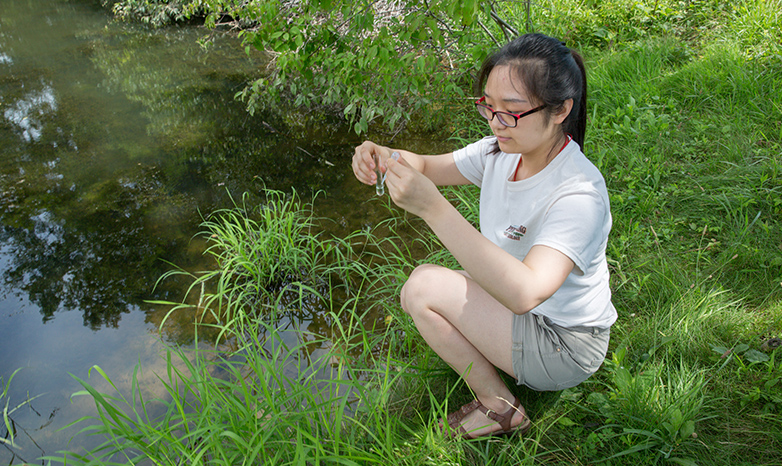SRU students gain field experience at Pymatuning Ecology Lab

Mengqi Wang, a senior biology major from Urumqi, China, collects a water sample to measure the nutrients. Wang was one of 10 SRU students who conducted field research this summer by enrolling in courses at the Pymatuning Lab of Ecology near Linesville.
Aug. 3, 2017
SLIPPERY ROCK, Pa. - College students enrolled in summer courses typically have to sacrifice opportunities for typical "fun in the sun," such as spending time at a lake. Fortunately, Slippery Rock University students can do both at the Pymatuning Lab of Ecology.
SRU is part of a consortium of 10 universities in western Pennsylvania that provide courses during four sessions, May 15-Aug. 4 at PLE sites surrounding Pymatuning Lake, about one hour northwest of the University, near Linesville.
The PLE facilities and housing units are owned by the University of Pittsburgh, but the courses, which provide valuable field experience, are taught by instructors representing several universities and agencies. There are 12 courses offered this summer, each for three weeks.
Ten SRU students, from the biology and geography, geology and the environment departments, enrolled in courses such as ornithology or freshwater ecology. Some SRU students, like Mengqi Wang, a senior biology major from Urumqi, China, took advantage of the opportunity by enrolling in multiple courses.
Wang took aquatic entomology, May 15-June 2, and an ecology lab, June 5-23. While she had previously collected samples as part of her SRU coursework, the PLE provided a different experience.
"I never had this type of class," Wang said. "I enjoyed it. It was my first time going outside the campus to sample something and learn from the field."
As part of her aquatic entomology course, which is the study of insects that inhabit freshwater ecosystems, Wang collected and identified insect species from the lake, streams and wetlands around Pymatuning Lake.
Aquatic insects such as mayflies are frequently used as important bioindicators to detect pollution and the quality of the ecosystem. Wang collected samples and, by the end of course, had to identify 25 different species without using a dichotomous key.
In her ecology course, her class explored the different ecosystems around the lake, measuring the nutrients in the water for wetlands and species dispersion and patterns in the grasslands.
According to Wang, the experience benefitted her in several ways:
-The four credits for the ecology course and three credits for the aquatic entomology course helped her more quickly fulfill her requirements to graduate. The classes met seven hours each weekday for three weeks.
-She was able to gain the type of field experience she wouldn't otherwise have had in on campus courses.
-By meeting with professors and students from other institutions she was able to gain different perspectives and advice for pursuing graduate school. She plans to enroll in a biostatistics master's program after graduating from SRU.
-The recreational activity was fun. The entomology class went to the Allegheny National Forest one night where they stayed in tents instead of the dormitories. Because this was only the second time Wang ever went camping, she found the experience relaxing and enjoyable.
SRU's involvement with the consortium is not new. University students and professors have participating in courses at the PLE since 2003. This year, David Krayesky, associate professor of biology, taught a field botany class.
According to Krayesky, many courses offered at the PLE aren't offered at other institutions because they fail to reach the critical mass without the consortium. Students' credits are earned as part of their school's curriculum and tuition still goes toward their own institution.
"It allows us to diversify our curriculum and give the students the ability to take other courses," said Krayesky, who previously taught a course at PLE in 2010. "If you're a student here and you want to tailor your curriculum, there are more options than simply what we offer here in the spring and the fall."
His botany course, which met June 5-23, was the perfect time for students to view wildflowers, shrubs and trees
"It provides a different element for students," Krayesky added. "This is a great experience to go to a field station for anybody who wants to be an organismal biologist, for sure."
SRU students interested in the PLE courses can enroll in the spring semester when they sign up for fall classes. For more information, visit: http://www.biology.pitt.edu/facilities/pymatuning/.
MEDIA CONTACT: Justin Zackal | 724.738.4854 | justin.zackal@sru.edu

